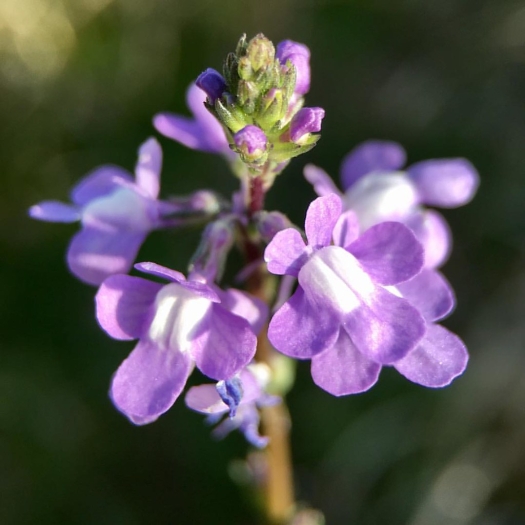Canada Toadflax
(Nuttallanthus canadensis)
Canada Toadflax (Nuttallanthus canadensis)
/
/

Norio Nomura
CC BY-SA 2.0
Image By:
Norio Nomura
Recorded By:
Copyright:
CC BY-SA 2.0
Copyright Notice:
Photo by: Norio Nomura | License Type: CC BY-SA 2.0 | License URL: https://creativecommons.org/licenses/by/2.0/ | Uploader: norio_nomura | Publisher: Flickr |





















































Estimated Native Range
Summary
Nuttallanthus canadensis, commonly known as Canada Toadflax, is an annual or biennial herb native to open woodlands and grasslands in North America. It typically grows to a height of 25–80 cm with slender, erect flowering stems. The leaves are linear, 15–30 mm long and 1–2.5 mm broad. The flowers, which are a notable feature, range in color from purple to off-white and are 10–15 mm long. They bloom from mid-spring to late summer and are quite showy, attracting pollinators such as bees and butterflies. Canada Toadflax also plays a role in the life cycle of the common buckeye by supporting its larvae, and its leaves serve as a food source for caterpillars.
In the garden, Canada Toadflax is valued for its ability to attract beneficial insects and for its delicate appearance. It is often used in wildflower meadows, borders, and as part of pollinator-friendly gardens. This plant is drought-tolerant and thrives in full sun, requiring low amounts of water once established. It prefers well-drained soils and can tolerate a range of soil types, from sandy to loamy. While generally low-maintenance, it can self-seed prolifically under ideal conditions, which may be considered invasive in some areas.CC BY-SA 4.0
In the garden, Canada Toadflax is valued for its ability to attract beneficial insects and for its delicate appearance. It is often used in wildflower meadows, borders, and as part of pollinator-friendly gardens. This plant is drought-tolerant and thrives in full sun, requiring low amounts of water once established. It prefers well-drained soils and can tolerate a range of soil types, from sandy to loamy. While generally low-maintenance, it can self-seed prolifically under ideal conditions, which may be considered invasive in some areas.CC BY-SA 4.0
Plant Description
- Plant Type: Herb
- Height: 1-3 feet
- Width: 0.333-1 feet
- Growth Rate: Moderate
- Flower Color: Blue
- Flowering Season: Spring, Summer
- Leaf Retention: Deciduous
Growth Requirements
- Sun: Full Sun
- Water: Low
- Drainage: Medium, Fast
Common Uses
Butterfly Garden, Drought Tolerant, Low Maintenance, Showy Flowers
Natural Habitat
Open woodlands and grasslands
Other Names
Common Names: Blue Toadflax, Field Toadflax, Old Field Toadflax, Linaire Du Canada, Indiansporre, Oldfield Toadflax, Oldfield-Toadflax
Scientific Names: , Nuttallanthus canadensis, Linaria canadensis, Linaria canadensis var. canadensis, Nuttalanthus canadensis, Antirrhinum canadense, Linaria canadensis f. albina, Linaria canadensis f. cleistogama, Anarrhinum canadense, Antirrhinum canadense var. assurgens
GBIF Accepted Name: Nuttallanthus canadensis (L.) D.A.Sutton